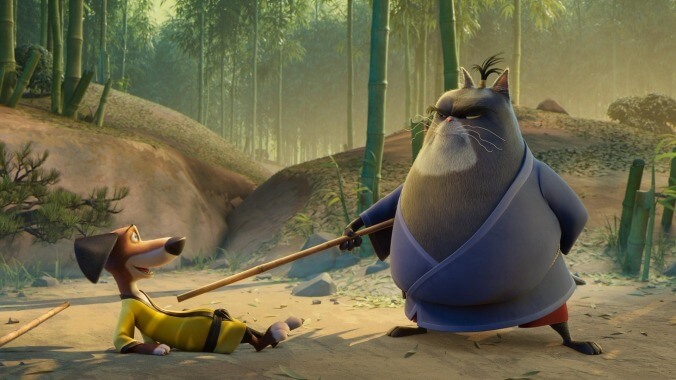Paws Of Fury turns a Mel Brooks' blueprint into a clearinghouse for Asian clichés
The animated martial arts-themed film will make viewers long for the nuance of Blazing Saddles

Released in 1974—and intended as a racial satire—Blazing Saddles got away with some stuff that’s problematic by today’s standards. Paws Of Fury: The Legend Of Hank reimagines Blazing Saddles as a samurai picture with animated talking animals. But creatives from the eight (count ’em) different production companies involved have apparently all been living under a rock for the last half century. Unless, of course, they’re delusional enough to think the premise is somehow less noxious if they replace all the characters with talking animals—which would not be at all surprising given the intellectual laziness and artistic bankruptcy in every other choice in this film.
This is no extrapolation: Originally titled Blazing Samurai, the film credits the screenplay by Mel Brooks, Norman Steinberg, Andrew Bergman, Richard Pryor, and Alan Uger as its basis. The update transplants the story from the American frontier to a feudal Japan populated by felines. These cats get around by riding horses, because the filmmakers clearly haven’t thought this through. The black sheriff part in the original is now a beagle named Hank (Michael Cera), who we find out in a flashback set to the West Side Story score aspires to be a samurai because other canines bully him back home. But dogs are not welcome in Japan, and he winds up on death row. Ika Chu (voiced by Ricky Gervais), who conspires to gain control of the village of Kakamucho, dispatches Hank there to assume the position of town samurai, knowing full well he will be chased out by the villagers. Instead, disgraced samurai Jimbo (Samuel L. Jackson essentially reprising his role from The Protégé) trains Hank to be the savior that Kakamucho so desperately needs.
Even in a cartoon, someone like Hank being oppressed in some exotic land is exactly the kind of toxic online strawman that is morally reprehensible for a studio to turn that into a motion picture in 2022. But by failing to exhibit any trace of affinity or reverence to Asian culture, martial arts or any of its narrative touchpoints, Paws Of Fury also exemplifies the worst kind of cultural appropriation. There’s no consultant listed in the credits, nor is there evidence that any research of that sort went into the screenplay or the animation. Among the some 300 cast and crew members listed in the film’s IMDb entry, you can count the Japanese names on one hand. Screenwriters Ed Stone and Nate Hopper name the fictional town Kakamucho not because it means anything in Japanese, but because you get something if you replace the Ks with Cs.








































